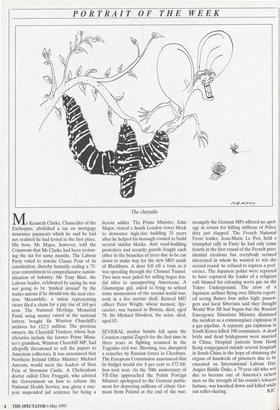PORTRAIT OF THE WEEK
The chrysalis MI Kenneth Clarke, Chancellor of the Exchequer, abolished a tax on mortgage insurance payments which he said he had not realised he had levied in the first place. His boss, Mr Major, however, told the Commons that Mr Clarke had been review- ing the tax for some months. The Labour Party voted to rewrite Clause Four of its constitution, thereby formally ending a 75- year commitment to comprehensive nation- alisation of industry. Mr Tony Blair, the Labour leader, celebrated by saying he was not going to be 'pushed around' by the trades unions if he should win the next elec- tion. Meanwhile, a union representing vicars filed a claim for a pay rise of 169 per cent. The National Heritage Memorial Fund, using money raised in the national lottery, bought Sir Winston Churchill's archives for £12.5 million. The previous owners, the Churchill Trustees, whose ben- eficiaries include the former Prime Minis- ter's grandson, Winston Churchill MP, had allegedly threatened to sell the papers to American collectors. It was announced that Northern Ireland Office Minister Michael Ancram, would meet the leaders of Sinn Fein at Stormont Castle. A Cheltenham doctor called Clive Froggatt, who advised the Government on how to reform the National Health Service, was given a one- year suspended jail sentence for being a heroin addict. The Prime Minister, John Major, visited a South London tower block to denounce high-rise building 25 years after he helped his borough council to build several similar blocks. Anti road-building protesters and security guards fought each other in the branches of trees due to be cut down to make way for the new M65 south of Blackburn. A door fell off a train as it was speeding through the Channel Tunnel. Two men were jailed for selling bogus feu- dal titles to unsuspecting Americans. A Glamorgan girl, asked to bring to school some momentoes of the second world war, took in a live mortar shell. Retired MI5 officer Peter Wright, whose memoir, Spy- catcher, was banned in Britain, died, aged 78. Sir Michael Hordern, the actor, died, aged 83.
SEVERAL mortar bombs fell upon the Croation capital Zagreb for the first time in three years as fighting resumed in the Yugoslav civil war. Shooting, too, disrupted a ceasefire by Russian forces in Chechnya. The European Commission announced that its budget would rise 8 per cent to £72 bil- lion next year. As the 50th anniversary of VE-Day approached the Polish Foreign Minister apologised to the German parlia- ment for deporting millions of ethnic Ger- mans from Poland at the end of the war; strangely the German MPs offered no apol- ogy in return for killing millions of Poles: they just clapped. The French National Front leader, Jean-Marie Le Pen, held a triumphal rally in Paris: he had only come fourth in the first round of the French pres- idential elections but everybody seemed interested in whom he wanted to win the second round: he refused to express a pref- erence. The Japanese police were reported to have captured the leader of a religious cult blamed for releasing nerve gas on the Tokyo Underground. The crew of a Japanese airliner flying over Siberia report- ed seeing flames four miles high; passen- gers and local Siberians said they thought World War III had begun but the Russian Emergency Situations Ministry dismissed the incident as a commonplace explosion in a gas pipeline. A separate gas explosion in South Korea killed 100 commuters. A dead bride and dead bridegroom were married in China. Hospital patients from Hong Kong congregated outside several hospitals in South China in the hope of obtaining the organs of hundreds of prisoners due to be executed on International Labour Day. Angier Biddle Duke, a 79 year old who was due to become one of America's richest men on the strength of his cousin's tobacco fortune, was knocked down and killed while


































































 Previous page
Previous page